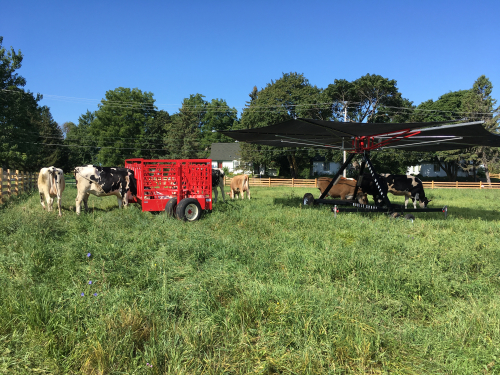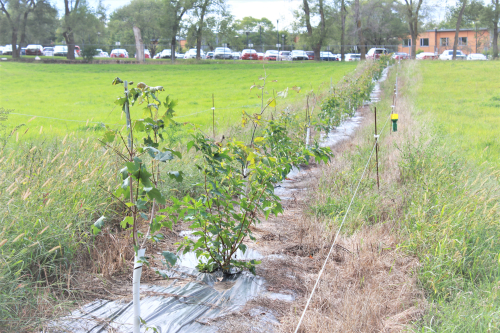Status: COMPLETE March 2019 - October 2019
This project intends to develop an ecological pasturing system that enhances animal nutrition & comfort while enhancing the environment.
Read the full project description
As part of McGill's objective to achieve carbon neutrality by 2040, the Macdonald Campus Farm can contribute by pasturing non-lactating dairy animals and a small flock of laying hens in an intensively managed rotational grazing system that provides optimum nutrition to the animals while improving soil organic matter and creating a natural environment for birds and pollinators. This could be used as a model for the industry, as well as to demonstrate a sustainable system to students, field advisors and the general public.
The project is divided into two parts. The first is the improvement of existing pasture for bred heifers and dry cows in the Mac dairy herd using Best Management Practices (BMP) for pasture that include legume and grass species selection, innovative, user-friendly and animal friendly fencing systems for intensive grazing, planting of trees and bushes to generate shade during the summer, water systems, and a rotational grazing strategy to manage the grass for a prolonged grazing season.
The second part is for putting in place a knowledge transfer strategy for McGill students, dairy producers and other visitors by using the Macdonald Campus Farm as a demonstration site. This integrates extremely well with the courses available in Animal Science, Plant Science, Natural Resource Science and the Farm management and Technology program. It will also be an important part of public visits that will ensue with the opening of the Macdonald Farm Community Engagement Centre.
Intensively managed rotational grazing dairy cattle will also help reduce the Macdonald Farm's carbon foot print by:
1) improving productivity of the pasture, which stores carbon;
2) reducing the amount of labour and equipment used in harvesting forage to feed cattle that might normally be housed indoors;
3) reducing the storage of manure in manure pits; and 4) increasing longevity of dairy cows by providing exercise and better comfort on pasture.
Changing long-standing practices in agriculture is complex and often requires convincing by example. The adoption of BMP for efficient and effective pasture management at McGill's Macdonald Campus Farm will be beneficial in the education of students at McGill by providing a practical and feasible example of BMP for pasture in addition to facilitating the transfer of knowledge to the producers.
Effectively implemented and managed, this project will introduce an environmentally friendly method to feed and house non-lactating dairy animals using BMP that drastically improve the inefficient, old-fashioned pasturing methods of our grandparents' generation, where cattle ran out of feed by the end of June and either got thin or had to be fed hay. With properly managed rotational grazing providing fresh grass, access to clean water and shade, the cattle will perform well, develop good muscle tone and be in better condition. It will change heifer raising on the Macdonald Farm and potentially on other farms, while demonstrating to McGill students, staff, and the community as a whole that McGill is taking initiative to reduce carbon emissions on its dairy farm and to improve the well-being of its animals - two major societal critiques regarding the dairy industry at this moment.
View photos


Connect with this project
|
